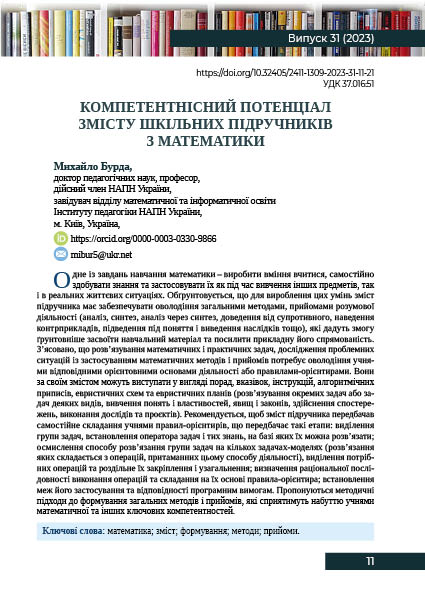Competence Potential of the Content of School Mathematics Textbooks

Published 2024-01-17
Keywords
- mathematics,
- content,
- formation,
- methods,
- techniques
How to Cite

This work is licensed under a Creative Commons Attribution-NonCommercial-ShareAlike 4.0 International License.
Abstract
One of the tasks of teaching mathematics is to develop the ability to learn, to acquire knowledge independently, to apply mathematics both in the study of other subjects and in real life situations. It is substantiated that in order to develop these skills, the content of a textbook should ensure that students master not only mathematical knowledge, but also general methods and techniques of mental activity (analysis, synthesis, analysis through synthesis, proof from the opposite, giving counterexamples, analogy, summarizing and deriving consequences, etc.), which will allow them to master the educational material more thoroughly and strengthen its applied orientation. It has been found that solving mathematical and practical problems, studying problem situations using mathematical methods and techniques requires students to master the relevant indicative foundations of activity or guidelines. They can be in the form of: advice, guidelines, instructions, algorithmic prescriptions, heuristic schemes, and heuristic plans (solving individual tasks or tasks of certain types, studying concepts and properties, phenomena and laws, making observations, performing experiments and projects). It is recommended that the content of the textbook provide for students’ independent compilation of guideline rules, which includes the following steps: selecting a group of tasks, establishing the task operator and the knowledge on which they can be solved; understanding how to solve a group of tasks using several task models (the solution of which includes operations inherent in this method of activity), selecting the necessary operations and their separate consolidation and generalization; determining the rational sequence of operations and compiling a guideline rule based on them; establishing methodological approaches to the formation of general methods and techniques that will contribute to the acquisition of mathematical and other key competencies are proposed.
Downloads
References
- Благодир, Л.А. (2018). Методика навчання математики в поняттях, схемах і таблицях: навчально-методичний посібник, Умань, Візаві. https://dspace.udpu.edu.ua/handle/123456789/14229
- Бурда, М.І. (2022). Особливості застосування геометричних фігур на практиці. Проблеми сучасного підручника, (28), 18–25. https://doi.org/10.32405/2411-1309-2022-28-18-25
- Бурда, М. І., & Тарасенкова, Н.А. (2015). Геометрія: підручник для 7 класу закладів загальної середньої освіти, Київ, Освіта.
- Васильєва, Д. В. (2018). Математичні задачі як засіб формування ключових компетентностей учнів. Проблеми сучасного підручника, (21), 83‒91. https://doi.org/10.32405/2411-1309-2018-21-83-91.
- Волошена, В.В. (2022). Практико орієнтоване навчання геометрії в гімназії. Проблеми сучасного підручника, (29), 32–42. https://doi.org/10.32405/2411-1309-2022-29-32-42
- Гордієнко, І.В. (2015). Активізація навчально пізнавальної діяльності учнів на основі методу аналогії у навчанні математики та фізики. Науковий вісник Ужгородського університету, (37), 31 – 34.
- https://dspace.uzhnu.edu.ua/jspui/handle/lib/10380
- Заболотний, В.Ф., Осика, А.С., & Левченко І.В. (2018). Формування універсальних навчальних дій в учнів початкових класів під час виконання навчально-дослідницьких проектів. Інноваційна педагогіка, (5), 41–44. http://innovpedagogy.od.ua/archives/2018/5/11.pdf
- Лобова, О.В., Парфілова, С.Л., & Пушкар, Л.В. (2020). Загальна характеристика прийомів розумової діяльності молодших школярів. Інноваційна педагогіка, 2 (29), 169–173. http://www.innovpedagogy.od.ua/archives/2020/29/part_2/35.pdf
- Парфілова, С.Л., Шаповалова, О.В., & Забара, Л.О. (2022). Послідовність та етапи процесу формування прийомів розумової діяльності молодших школярів. Інноваційна педагогіка, 2 (50), 162–165. http://www.innovpedagogy.od.ua/archives/2022/50/part_2/32.pdf
- Скрипченко, Ю.А. (2004). Зміст аналітичних методів пошуку розв’язання планіметричних задач. Дидактика математики: проблеми і дослідження, (2), 81–84. http://dm.inf.ua/_21/81-84%2021_2004.pdf
- Слєпкань, З.І. (1983) Психолого-педагогічні основи навчання математиці: методичний посібник, Київ. https://www.mathedu.ru/text/slepkan_psihologo-pedagogicheskie_osnovy_obucheniya_matematike_1983/p78/
- Шикиринська, О.В., Вишківська, В.Б., & Родюк, Н.Ю. (2019). Проблемний підхід у формуванні математичної компетентності майбутніх вчителів початкової школи. Наукові записки НПУ імені М.П. Драгованова, 17 (1), 204–209. http://enpuir.npu.edu.ua/handle/123456789/31977
